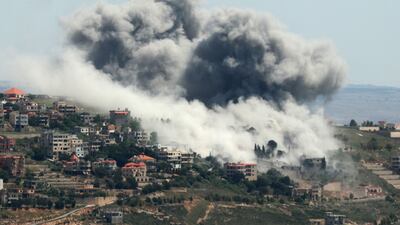Live updates: Follow the latest on Israel-Gaza
At least four people were killed in an Israeli strike on a car in the southern Lebanese village of Baflieh on Thursday morning, the latest in a string of attacks on both sides of the Israel-Lebanon front this week.
Lebanon’s powerful armed group Hezbollah acknowledged the death of two fighters who died “in defence of south Lebanon, in an Israeli drone strike in the rear" in Baflieh.
Two passers-by were also killed and another injured, according to the Al Risala Scouts, a civil defence organisation that operates in south Lebanon.
“The two people died within proximity to the car,” a representative told The National.
Thursday’s casualties follow the previous day’s deaths:
On Wednesday, Israel acknowledged the death of an Israeli sergeant in a Hezbollah-claimed attack on a military site in Al Malkieh. Meanwhile, five militants were killed in Israeli strikes on Lebanon.
Earlier, two Israeli soldiers were killed in a Hezbollah-claimed drone attack on an army position near the Israeli town of Metulla.
The death of the three Israeli soldiers this week brings the military death toll for the northern Israel front to 13, in addition to nine civilians, according to Israeli authorities.
Hezbollah leader Hassan Nasrallah has repeatedly claimed Israel is hiding the true number of its casualties.
In Lebanon, more than 350 people have been killed in the south since the conflict began in October, according to official government figures. At least 73 were civilians while the majority were militants.
The conflict along the Lebanon-Israel frontier has ebbed and flowed in parallel with the war in Gaza, remaining constant but intensifying during key periods. Hezbollah has repeatedly conditioned a ceasefire in Lebanon on a truce in Gaza.
Now, as Israel prepares for an incursion into Rafah – a city sheltering about 1.4 million Palestinians, by the UN’s count – Lebanon’s front has intensified once again.
Tens of thousands of people on both sides of the Lebanon-Israel border remain displaced as the war rolls into its eighth month.
As Gaza ceasefire negotiations stall between Israel and Hamas, and a large-scale Israeli military operation on Rafah seems imminent, Lebanon remains on edge.
When asked whether Hezbollah planned to further intensify the conflict with Israel, a representative for the Iran-allied party replied: “Everything in due time.”
Mr Nasrallah has consistently promised to match Israel’s intensity. Despite initiating the conflict in October, Hezbollah has remained committed to its rule of proportionality – seeking to support Hamas without drawing the fragile Lebanese state into full-scale conflict.

“All options are on the table. Our eyes are on Gaza as we fight on the border,” Mr Nasrallah said in a speech in February, directly addressing the Israeli state. “If you widen [the front], we will widen. If you intensify, we will intensify.”
Militant groups in Iraq, Syria and Yemen, where the Iran-allied Axis of Resistance has become entrenched, are also vigilant.
In Iraq, Iran-backed Shiite armed factions have been monitoring the situation in and around Rafah. No decision has been made to escalate yet – for now.
“Till now, there are no indications that the Israelis want to launch a full-blown operation in Rafah,” a Shiite politician linked to Iran-backed militia groups told The National.
“Their latest moves are seen as attempts to pressure Hamas during ongoing negotiations."
Asked whether there will be a unified response or escalation in the case of full an Israeli invasion, he said: “Nothing solid on that yet, as such move will need co-ordination with other players in the region."
Limited response
A former senior member of Jordanian intelligence, Saud Sharafat, said he expected Iran to respond through its proxies to any ground Israeli assault on the urban core of Rafah.
But the response would be limited to the level of the attacks that preceded direct hostilities between the two countries last month, Mr Sharafat told The National, following the rule of proportionality established by Mr Nasrallah.
former senior member of Jordanian intelligence
In April, Iran attacked Israel with 300 drones and missiles, almost all of which were intercepted. The attack was in response to an Israeli barrage on an Iranian compound in Damascus that killed senior commanders of Iran’s Quds Force in Syria.
“Beyond proxy attacks, Iran will not move if Hamas comes on the brink of destruction in Rafah,” said Mr Sharafat.
Mr Sharafat, who heads the Shorufat Centre for the Study of Globalisation and Terrorism, said Iran will not risk war with Israel for the sake of Hamas, and that the two countries have maintained “mutual silence” since the direct hostilities between them in April.
“Iran has larger interests beyond Hamas,” he said.
'All depends on Gaza'
As clashes escalate at the border, western diplomatic efforts have intensified to restore safety at the Lebanon-Israel border.
On Tuesday, Hezbollah officially submitted some amendments to the French proposal for de-escalation at the frontier.
"There is a long road ahead but it is a positive step. Hezbollah proposed amendments are not insurmountable, there is space for negotiations," a western diplomatic source told The National.
The source denied earlier reports that Hezbollah had rejected the French proposal, adding that the next steps are to present the proposed modifications to the US and the Israelis.
France, a former colonial power in Lebanon, has maintained a strong influence in Lebanese politics.
In February, France presented the first written proposal to Lebanese authorities to end border hostilities. The US is also leading an initiative spearheaded by its envoy Amos Hochstein.
Unlike the US, France has established a distinction between the political and military arm of Hezbollah, the latter of which it views as terrorist, allowing France to maintain direct relations with the group.
But a breakthrough does not seem plausible as long as the Gaza war continues.
"Diplomatic efforts will keep pushing forward with these pre-negotiations, which will lay the ground for a proper plan when there will be a window of opportunity," the source said.
"But it all depends on Gaza."

